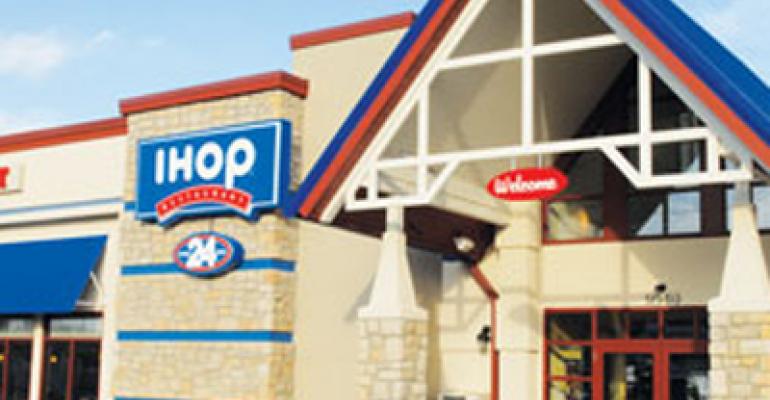DineEquity Inc., parent to IHOP and Applebee's, said Tuesday it would reevaluate the IHOP's brand use of value as sales for the family-dining chain fell, even as the turnaround at Applebee's continued to gain momentum.
Second-quarter results for DinEquity were hurt by IHOP's performance, which included a 2.9-percent drop in same-store sales, but also were depressed by impairment charges and the refranchising initiative at Applebee's.
For the second quarter ended June 30, Glendale, Calif.-based DineEquity reported a 98-percent drop in net income to $348,000, or 2 cents per share, compared with $14 million, or 42 cents per share, for the same quarter a year ago. Corporate revenue fell 21 percent to $268.3 million.
DineEquity's profit drop reflected closure charges related to the move of Applebee’s support center in Lenexa, Kan., as well as the refranchising of 148 Applebee’s restaurants as the company moves toward an almost-all-franchised system.
DineEquity's stock fell 18.4 percent Tuesday to close at $43.71. The market in general was depressed Tuesday, as the Dow, Nasdaq and S&P 500 indexes each fell more than 2 percent.
Get all restaurant-related stock information on NRN's Market Monitor.
Applebee's second quarter upswing
Since DineEquity acquired the casual-dining brand in 2007, the turnaround at Applebee’s Neighborhood Grill & Bar has been a priority and company officials said efforts are paying off.
Applebee’s domestic systemwide same-store sales increased 3.1 percent for the quarter, which the company said was driven by increases in average check and traffic. The casual-dining chain’s sales have been positive for a full year, the company said.
Domestic franchised Applebee’s locations reported a 3.5-percent increase in same-store sales during the second quarter, while company-operated locations were up 0.7 percent.
Julia Stewart, DineEquity’s chair and chief executive, said daypart-specific marketing strategies, menu enhancements and restaurant remodels have helped improve momentum.
Remodeled units outperform the rest of the system and 155 restaurants have had upgrades so far this year. Since early 2010, 286 have been remodeled, she said.
International expansion for the brand also has continued. Last week, the company announced a move into Egypt, where a franchisee plans to open 10 Applebee’s restaurants.
During the quarter, the company also announced an agreement for the sale of 66 company-operated locations in New England to Apple American Group LLC in a deal expected to close before the end of the year.
“We believe we’re in the sixth or seventh inning, so we’re not finished,” Stewart said. “But we’re pleased with what we’ve seen so far.”
IHOP struggles
On the other hand, IHOP’s same-store sales fell 2.9 percent during the second quarter, despite a higher average check and a positive benefit from the calendar shift of the Easter holiday. Excluding the impact of the holiday, IHOP’s same-store sales would have fallen 3.4 percent for the quarter, the company said.
Stewart said research indicates that IHOP guests want to see more focus on value and the company has launched new initiatives aimed at improving performance going forward.
“There is more that can and will be done to optimize our menu, improve restaurant operations, and deliver the right everyday value offering that I believe are the keys to restoring growth at IHOP,” she said.
Immediate efforts include improving operations by expediting table turns and training staff to improve guest engagement, and re-energizing the brand with more effective marketing efforts and menu enhancements.
IHOP, for example, recently launched a new advertising campaign with the tagline “Make it an IHOP Day,” and hired former Burger King executive Natalia Franco as senior vice president of marketing.
Earlier this year, the company tried tweaking the way advertising dollars were spent, but the change did not bring expected results and, without going into specifics, Stewart said the company has returned to its old strategy.
In June, the company announced plans to open 40 IHOP restaurants in nine countries in the Middle East over the next five years, the first move outside North America and the largest development deal ever for the brand.
This week the chain brought back its Kids Eat Free promotion to help parents deal with the budget stress of a new school year.
Stewart said IHOP already is positioned to offer great value, but the company needs to do a better job of communicating its value proposition.
“We’ve got it,” she said. “We just haven’t made as big a deal of it as we should.”
Efforts to better communicate value may include a redesigned menu, she said, or “different ways of talking about the brand,” both at a local and national level.
Though commodity inflation is expected to be about 2 percent to 3 percent for Applebee’s and about 5 percent for IHOP, Stewart said both brands continue to have pricing power.
“Consumers are much more value conscious today,” Stewart said. “We need to be thoughtful as we price but also create engineered value.”
DineEquity reiterated projections for the year at Applebee’s of systemwide same-store sales increases between 2 percent and 4 percent.
IHOP’s same-store sales are expected to be on the low end of a range between positive 1 percent and down 2 percent.
At the end of the quarter, DineEquity operated 244 Applebee’s and franchised another 1,767 for a total of 2,011. The 1,512 IHOP chain is almost all franchised.
Contact Lisa Jennings at [email protected].
Follow her on Twitter: @livetodineout

